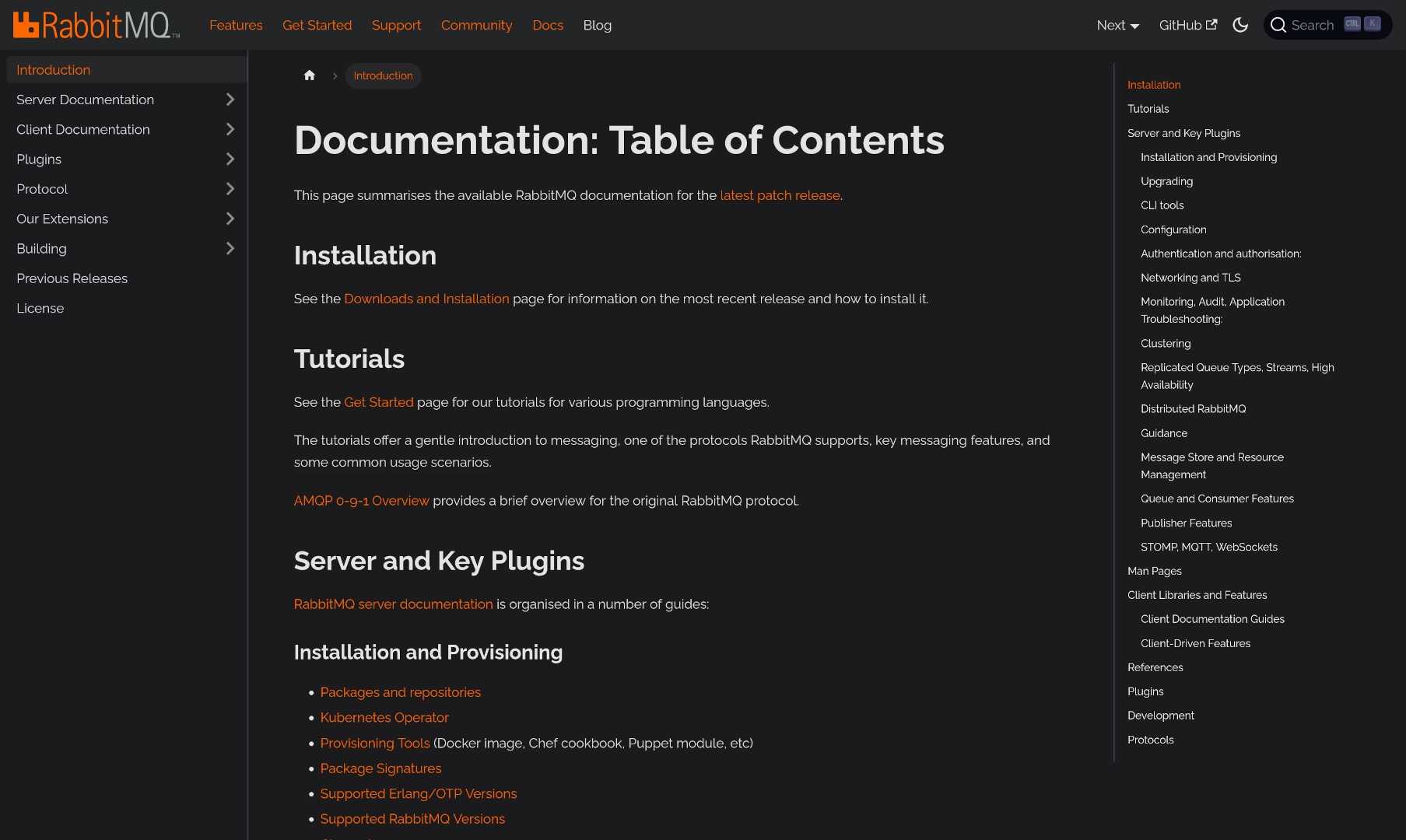New website for RabbitMQ 3.13.0
We have been working for several weeks on a new website for RabbitMQ. We plan to release this significant upgrade shortly after RabbitMQ 3.13.0 is released! At this point, we would love you to visit the new website and tell us what you think :-)
In this blog post, I will go over the reasons we are doing this and what improvements it will bring to you.
Limitations of the current website
Only the latest RabbitMQ version is documented
As of this writing, the www.rabbitmq.com website contains the documentation of the RabbitMQ server, some AMQP clients and it offers tutorials to get started with RabbitMQ.
The documentation covers the latest version of RabbitMQ only ‑ currently 3.12.x. That was ok-ish so far because new releases series usually come with new additions. However, with the upcoming RabbitMQ 4.0.x, significant deprecated features will be removed! If we continue like this, it means the documentation for these dropped features will go away. This is a real problem for people who will still be running RabbitMQ 3.12.x for some time.
This is the first and main reason we want to upgrade the website: we want the documentation to cover many versions of RabbitMQ: old, current and upcoming.
We could take a snapshot of the website and publish it somewhere else, like previous.rabbitmq.com in the past. But the Git repository/workflow and the home-grown framework don't make this easy, that's why we stopped keeping snapshots of older versions. We would make a better job if the workflow and the tooling had room for maintaining several versions easily and all of them would be published to www.rabbitmq.com in a way that it is easy for users to switch to whatever version they are running.
This brings me to the second reason behind the big upgrade.
In-house framework
The website is statically generated and published to a Cloudflare worker. The static generator we used was developed by the RabbitMQ team a decade ago and barely evolved ever since.
Making or maintaining a website framework is definitely not the best way to invest our time. There is still plenty of work on RabbitMQ itself :-) So instead of adding multiple versions support to it, we looked at existing FOSS static website generators that had this feature built-in and evaluated a few of them.
We chose Docusaurus. It supports multiple versions ‑ our primary criteria ‑ and it uses Markdown as the markup language, thus we don't have to rewrite anything. This would make the conversion easier.
“What's in it for me?”
With Docusaurus, we, the RabbitMQ team, make our life easier, yay \o/ But “are there any benefits for you”, you may ask?
Multiple versions documented
Of course, you will be able to read documentation of past and new versions of RabbitMQ, even the future one while it is being worked on.


Initially, it will only cover RabbitMQ 3.13.x because we didn't convert previous versions to Docusaurus. A snapshot of RabbitMQ 3.12.x documentation will be published on previous.rabbitmq.com instead.
We plan to keep all supported RabbitMQ versions docs on the new website. When an old release series reaches end-of-life, its documentation will also move to previous.rabbitmq.com. This is to avoid that the version dropdown becomes too cluttered or that the search feature brings too many results which are less relevant.
Speaking of search...
Integrated search feature
Docusaurus integrates several solutions to provide an internal search feature. We picked Algolia because it is very efficient and works well with multiple versions.


The entire website, including the blog, will be indexed and searchable. In the example above, I searched "MQTT" and Algolia returns blog posts and documentation pages in the results.
What is not obvious on the screenshot however is that it only returned docs from the current version I'm browsing! So if I selected an hypothetical RabbitMQ 5.2.x in the dropdown version menu, I would only get results relevant to that version.
Integrated blog
As mentionned above, Docusaurus provides a blog. We will switch to it and stop using blog.rabbitmq.com. This way, all RabbitMQ-related content will be in a single place:
- It will be easier for you to browse and move between blog posts and docs.
- As said, the internal search will consider both docs and blog posts.
- For content writers, it will be easier to cross-reference between blog posts and docs.
Mobile version and dark mode
Docusaurus being slightly more modern than our in-house framework, the new website should be browsable comfortably on a small screen and on mobile devices.
It also comes with a dark mode!

Conclusion
We are very excited with this move to Docusaurus and everything that the new website will bring to you! Beside the conversion to a new framework, we also plan many improvements to the content itself! Things like... No, let's talk about this in a future blog post on the new website once we have something to show :-)

Meanwhile, we would love your feedback! We know there are some rough edges after the conversion, some parts we couldn't map easily to Docusaurus alternatives. So, do you find the new website comfortable? Anything you lose that you love on the old one?
Here are a couple links to help you with this:
Thank you so much for any constructive positive or negative comments you might share!


